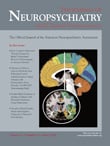Chronic Motor Tic Disorder and Aripiprazole
To the Editor: Aripiprazole has been shown to be efficacious in the therapy of Gilles de la Tourette Syndrome. 1 , 2 To our knowledge, no case of chronic motor or vocal tic disorder in adult patients who have been treated with aripiprazole has been reported yet. There are hints from genetic studies that chronic tic disorders are genetically closely related to Tourette’s syndrome. 3 However, a successful treatment of adult patients with the chronic motor tic disorders is conceivable but cannot necessarily be concluded. We present two cases with chronic motor tic disorder according to DSM-IV who were successfully treated with aripiprazole.
Case Reports
Patient A is a 25-year-old man with motor tics in the form of involuntarily nodding and shaking head movements without any past or present vocal tics. After having developed side effects due to hyperprolactinemia under tiapride, the medication was switched to aripiprazole. Daily dosing was raised from 5 mg at the onset of aripiprazole treatment to 15 mg. On the Yale Global Tourette Severity Scale (YGTSS) 4 a total tic score of 13 at the beginning was reduced to 3. The impairment score was reduced from 30 to 0. Aripiprazole was administered for 12 months; after subsequent reduction and discontinuation the tics remained mild and did not increase again.
Patient B is a 23-year-old man with motor tics predominant in the face and at the neck. He reported grimaces and turning movements of the neck. Additionally, eye blinking and eye movements were reported. The tics had begun by the age of six and the earliest tic noticed by the parents had been an eye blinking. More severe tics in the form of grimaces had occurred approximately 2 years before. Treatment with tiapride was initiated. After having developed side effects in the form of fatigue, lack of drive and erectile dysfunction the medication was switched to aripiprazole. Daily dosing was raised from 5 mg at the onset of aripiprazole treatment to 15 mg; while taking 15 mg he reported mild attentional disturbances that vanished after a reduction to 10 mg. On the Yale Global Tourette Severity Scale, his total tic score of 19 at the beginning was reduced to 10. The impairment score was reduced from 40 to 20. Mild akathisias in both cases vanished under propanolol. The patient has been successfully treated with aripiprazole for 8 months now.
Discussion
A tachyphylactic loss of the efficacy, as often seen in Tourette’s syndrome pharmacotherapy, was not visible in either of the patients. The fact that the remission of the tics lasted despite the withdrawal of the medication in Patient A can be interpreted in accordance with the waxing and waning character of tic disorders. 5 These two cases provide a first hint that aripiprazole may be efficacious not only in full blown Tourette’s syndrome but also in chronic motor tic disorders. A double-blind trial against placebo or other neuroleptics is advisable to verify the efficacy of aripiprazole in the pharmacotherapy of chronic tic disorders.
1. Davies L, Stern JS, Agrawal N, et al: A case series of patients with tourette’s syndrome in the United Kingdom treated with aripiprazole. Hum Psychopharmacol 2006; 21:447–453Google Scholar
2. Kawohl W, Schneider F, Vernaleken I, et al: Aripiprazole in the pharmacotherapy of Gilles de la Tourette syndrome in adult patients. World J Biol Psychiatry 2008; 11:1–5 [Epub ahead of print]Google Scholar
3. Tourette Syndrome Association International Consortium for Genetics: Genome scan for Tourette disorder in affected-sibling-pair and multigenerational families. Am J Hum Genet 2007; 80:265–272Google Scholar
4. Leckman JF, Riddle MA, Hardin MT, et al: The Yale Global Tic Severity Scale: initial testing of a clinician-rated scale of tic severity. J Am Acad Child Adolesc Psychiatry 1989; 28:566–573Google Scholar
5. Jankovic J, Fahn S: The phenomenology of tics. Mov Disord 1986; 1:17–26Google Scholar



